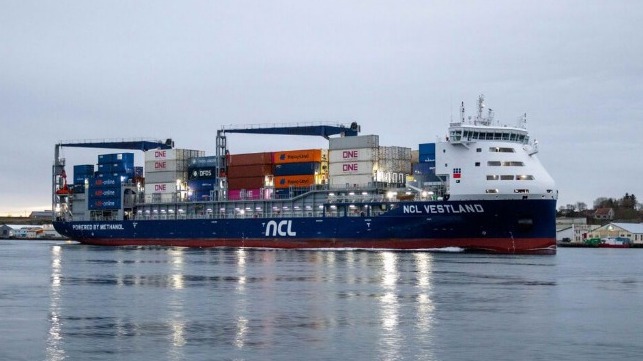Norway’s First Bio-Methanol Feeders Enter Service

Norway marked a milestone in its efforts to be a leader in green shipping with the introduction of the first of two vessels that will be powered with bio-methanol. The containerships which are operating in a partnership between North Sea Container Line and MPC Container Ships will expand Norway’s trade with Europe while also lowering emissions.
NCL Vestland is the first of the two vessels and today, April 1, they celebrated the naming and entry into service of the ship, with her sister ship NCL Nordland to follow. The ships were ordered in 2023 under a program in part sponsored by the Norwegian government to advance green shipping. The project received NOK 13.7 million (US$1.3 million) in funding from Enova SF, the state enterprise owned by the Norwegian Ministry of Climate and Environment, and NOK 60 million (US$5.7 million) from the NOx fund (Næringslivets NOx-fond), the Norwegian business sector’s fund to reduce emissions.
The ships were built by China’s Taizhou Sanfu Ship Engineering and are fitted with dual-fuel engines capable of operating on conventional fuel or green methanol. The newbuilds will reduce NCL’s overall CO2 emissions by 50 percent, compared to the existing NCL fleet, when operating on diesel. In 2025, NCL will operate the vessels with a 5 percent blend of bio-methanol and the strategy is to gradually increase the bio-methanol going forward. NCL has signed an agreement with Equinor for the sourcing of the methanol and the vessels will be bunkering in Norway.
The hull, which is 149 meters (489 feet) in length, along with the propellers, and onboard systems are designed for maximum energy efficiency. The ships are each equipped with a 250 kWh battery pack and the capability to use shore power. Each ship has a capacity of 1,300 TEU. They feature an "Open Top" design which the companies highlight minimizes the need for crew on deck, further enhancing safety. The electric cranes on deck are designed to enhance efficiency when in port, independent of onshore infrastructure providing increased flexibility in the ports they can access.
The plan calls for three older vessels to be replaced by the two new ships, each of which has a 40 percent greater container capacity compared to the ships currently operating the feeder service. As such, NCL reports that the vessels will achieve a 63 percent reduction in energy capacity per TEU per nautical mile.
The ships are operating under a 15-year chart to NCL and have long-term contracts for transportation from Norway including with Elkem, a provider of silicon-based materials. With stops at key industry hubs in Norway, Elkem says they will enable larger weekly shipments of its silicon products to European customers in sectors such as automotive manufacturing, construction, renewable energy, and the defense industry, and enable growth and jobs along the Norwegian coast.
“These state-of-the-art vessels will play a significant role in transporting Norwegian goods and strategic silicon metals and materials to the continent, cementing Norway’s position as an important and reliable supplier of critical inputs for European industries,” said Morten Viga, CFO of Elkem.
The vessel will operate between Stokmarknes and Rotterdam, Bremerhaven, calling at Salten, Mo i Rana, Orkanger, Averøy, Ålesund, Svelgen, Bergen, Haugesund, and Tananger. It will supply Europe with strategically important minerals, fish food, and other commodities via the ports of Bremerhaven and Rotterdam.
NCL highlights this is the first of three zero-emission capable vessels it will be introducing. In addition to the two methanol-fueled feeders, NCL will operate the world’s first ammonia-powered container vessel in a project with ammonia-producer Yara International and its subsidiary Yara Clean Energy and the support of the Norwegian Government through its Enova investment fund. The ammonia-powered feeder project was announced in 2023 with a target of starting operations in 2026.
